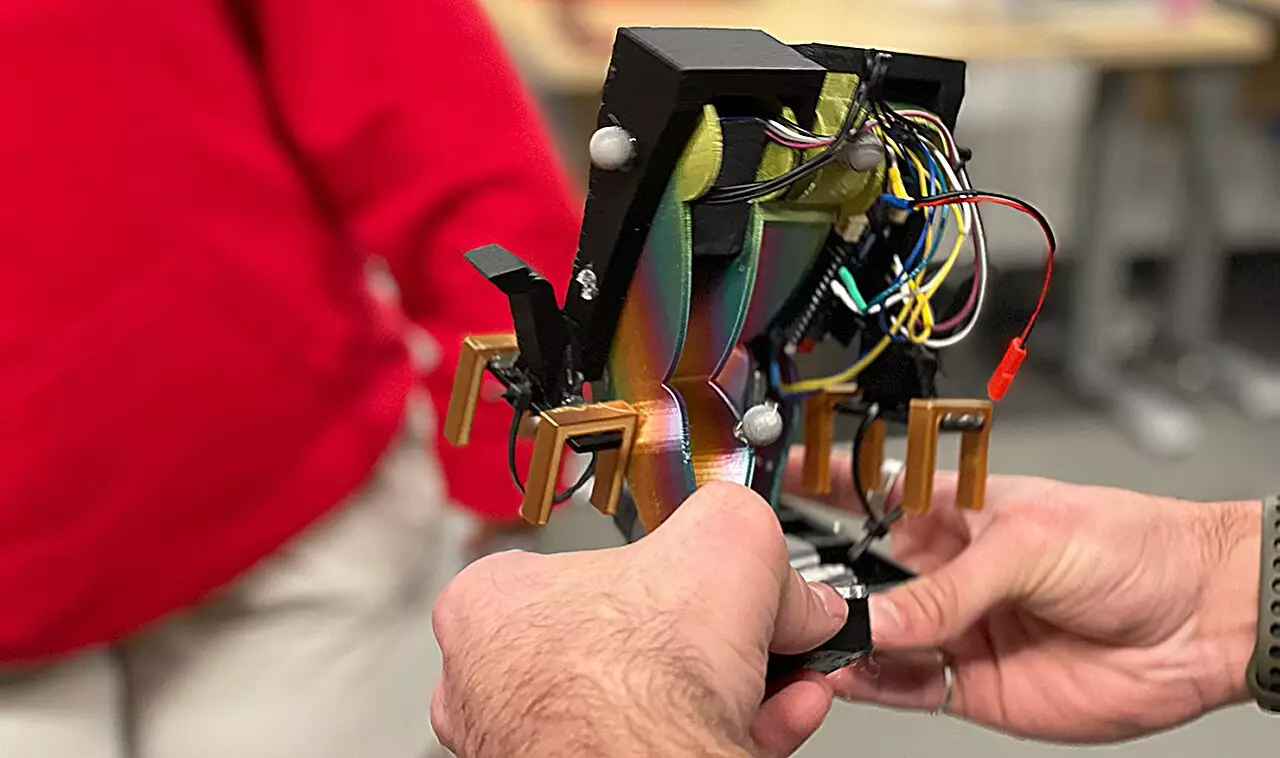Small robots play a crucial role in investigating and inspecting confined spaces that are inaccessible to larger robots. They possess the remarkable ability to maneuver around obstacles and navigate through narrow paths. This capability allows them to excel in scenarios such as machinery inspection or search and rescue missions in disaster-stricken areas. Nonetheless, constructing small robots that are self-steering and self-powered presents significant challenges due to their size limitations. However, a groundbreaking breakthrough has been achieved by a team of researchers led by Aaron Johnson and Sarah Bergbreiter, professors of mechanical engineering, with the creation of “Mugatu.” This remarkable creation represents the world’s first steerable bipedal robot, driven by a single motor, and capable of self-contained, self-starting operations. Its design is revolutionizing the field with its unique ability to perform complex motions using a simple walker design. Let us delve into the details of this innovative feat and its potential implications.
Mugatu’s conception was born out of a desire to simplify the locomotion of robots, utilizing a scaling approach to adapt existing designs to fit smaller spaces and carry heavier loads. James Kyle, a recent mechanical engineering graduate and a member of the research team, emphasizes the importance of comprehending how scaling impacts locomotion and the subsequent implications for robotic applications. The team’s primary objective was to streamline the walking mechanism as much as possible, resulting in the development of a robot capable of traversing challenging terrains. Mugatu achieves remarkable agility and maneuverability through its innovative design, comprising only two rigid bodies and a single actuator. This minimalistic approach not only enhances its capabilities but also contributes to its simplistic aesthetics, which have garnered substantial attention from the robotics community.
In the pursuit of pushing the boundaries of small robot efficiency, the team incorporated a current sensor into Mugatu. The current sensor plays a crucial role in calculating the total cost of transport, which measures the energy consumed over a given distance. Kendall Hart, an undergraduate mechanical engineering student and member of the team, recounts the learning experience gained from working on this aspect of Mugatu’s development. Through hands-on application, Kendall not only strengthened her grasp of MATLAB (a programming platform) but also developed proficiency in debugging without constant mentor assistance. This remarkable progress showcases how involvement in groundbreaking projects like Mugatu can significantly enhance students’ skills and confidence in practical problem-solving.
Dubbed “The LEGO Project,” the team envisions a future where these walkers can be downsized to the scale of LEGO creations. However, they acknowledge the challenges and fundamental changes that accompany this downsizing endeavor. Mechanical engineering undergraduate Kendall Hart highlights the complexity associated with scaling down robots, explaining how the mechanics and dynamics of the machine dramatically transform with size reduction. This ambitious ambition to miniaturize the robots showcases the groundbreaking nature of Mugatu and its potential impact on the robotics community. The ability to create highly efficient small robots with simplified designs has promising implications for various industries and applications.
The creation of Mugatu by the research team led by Aaron Johnson and Sarah Bergbreiter marks a revolutionary milestone in the field of small robots. Its steerable bipedal design driven by a single motor sets a new standard for maneuverability and versatility. Mugatu’s simplicity and elegance serve as a testament to the team’s ingenuity, demonstrating that groundbreaking innovation can emerge from a streamlined approach. The integration of a current sensor furthers the goal of achieving higher efficiencies in small robots, optimizing their energy consumption. As the team’s visionary LEGO Project progresses, the future holds immense potential for miniature robots that can navigate intricate spaces and perform complex tasks. The impacts of Mugatu’s design transcend the world of robotics, influencing various sectors and opening doors to new possibilities. With Mugatu’s arrival, small robots are on the cusp of a new era, where simplicity and efficiency fuel their potential for transformative applications.


Leave a Reply